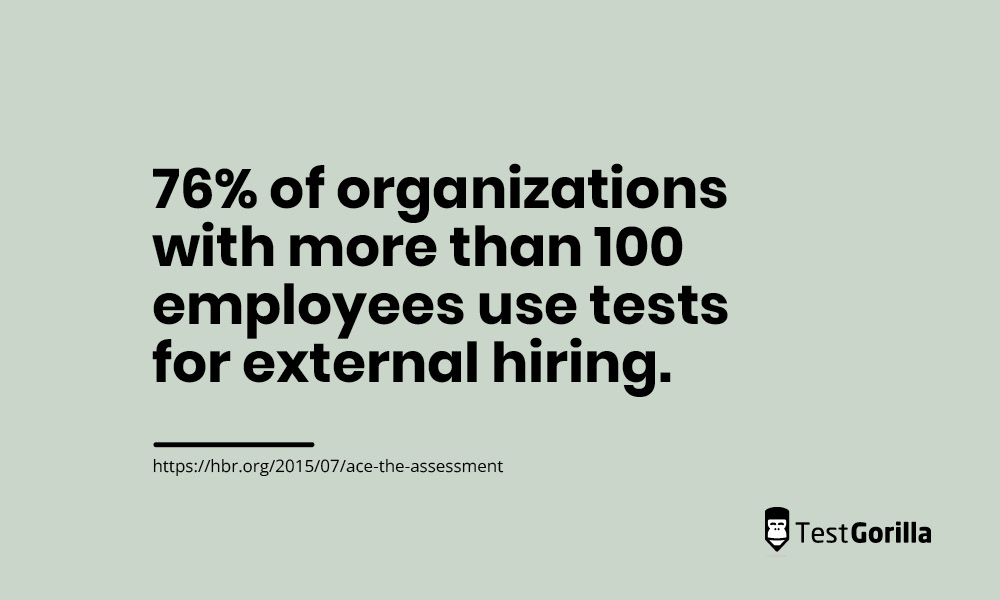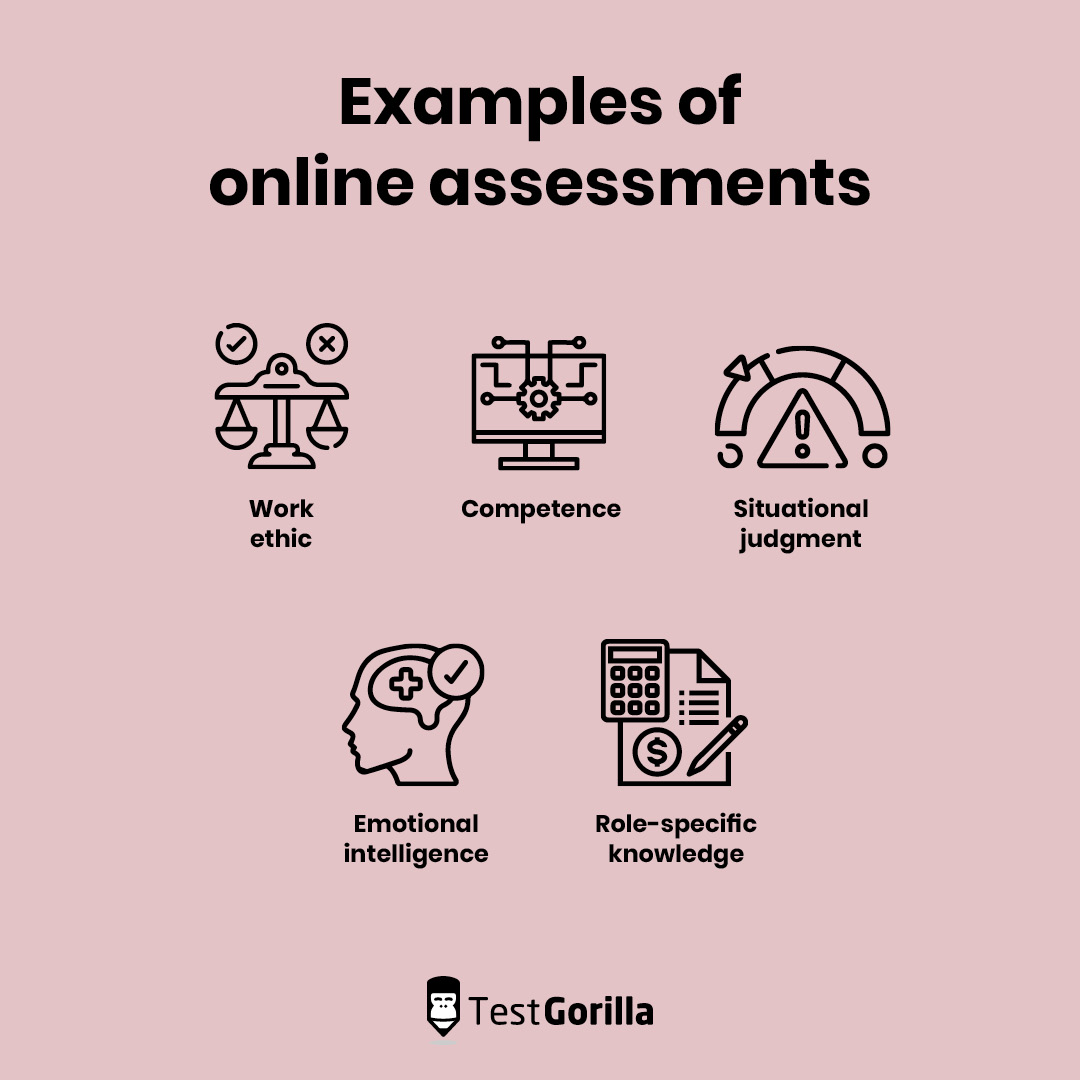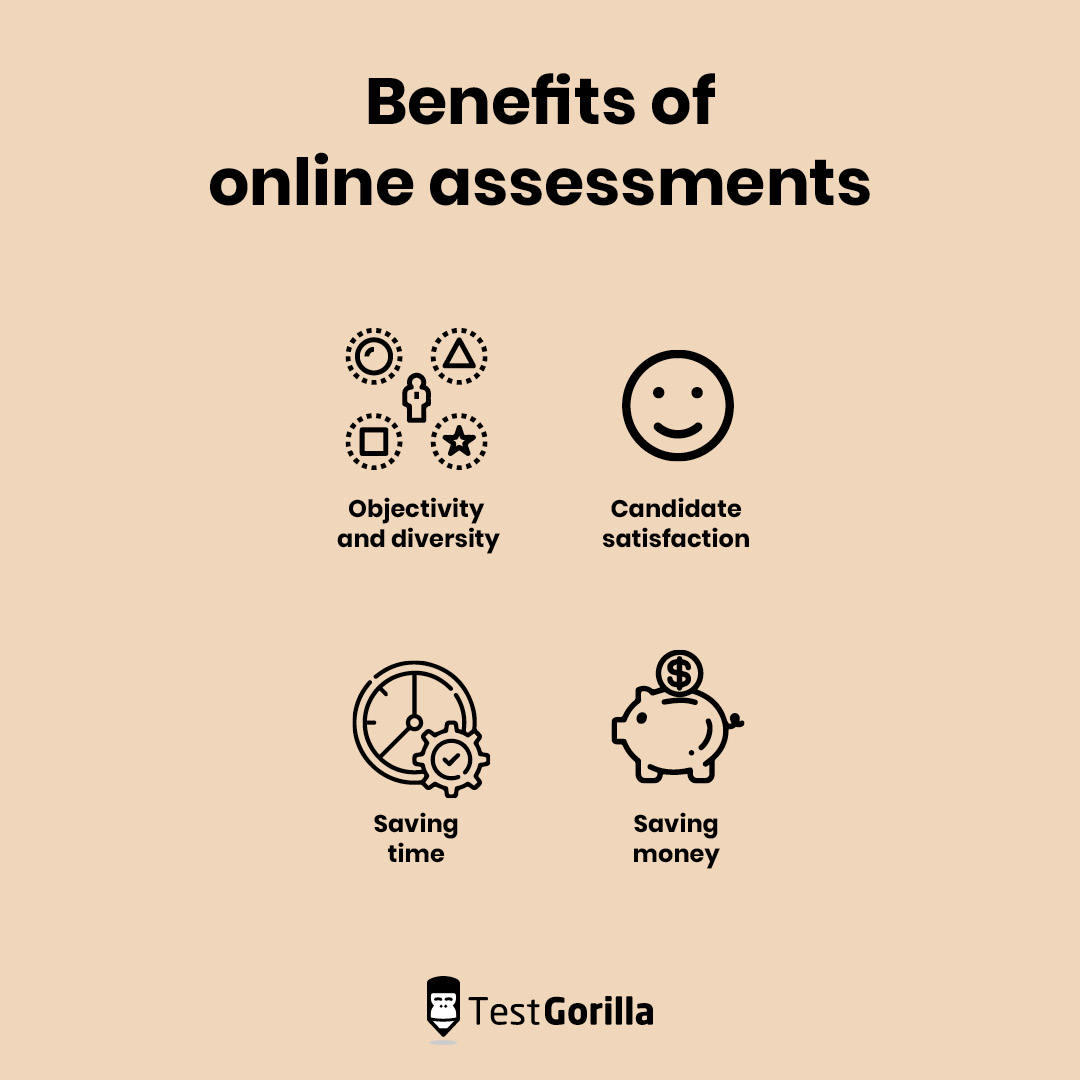Did you know that over 80% of companies in the US Fortune 500 companies use online assessment tools for their recruitment processes?1
And if you think online assessments are just for the big corporates, think again.
Approximately 76% of companies with more than 100 employees use aptitude and personality tests to hire externally.2 That figure is expected to reach 88% in a few years.
So if you’re thinking about using assessment tools to aid your recruitment process, read on to discover everything you need to know to decide if they’re the right fit for you and your organization.
Table of contents
- What are online assessment tools?
- What can I test with online assessments?
- What can’t you test using online assessments?
- What is asked in online assessment tests?
- What can I expect from an online assessment?
- Examples of online assessments
- How do I pass an online assessment test?
- Online assessment tools for recruitment – summary
What are online assessment tools?
Online assessments help companies to understand how well-suited a candidate is for a particular job.
They assess aspects such as personality, specific abilities, aptitude, motivations, and behaviors, giving you a rounded view of each candidate.
This also means that online assessment tools are not just for recruitment. You can use them throughout an employee’s career in your organization.
If you’re an HR manager whose role goes beyond recruitment and hiring, you can use online assessments to identify skills gaps and areas for training, development, and career counseling.
What can I test with online assessments?
Many different kinds of assessments exist, but most of them fall into three main categories:
Personality tests – designed to test a candidate’s “soft” skills, such as sensitivity, ambition, and cooperation within a team.
Knowledge tests – designed to test a candidate’s professional expertise, such as coding skills in a particular computer language like Ruby, and language proficiency.
Aptitude/performance tests – designed to test a candidate’s abilities. Examples include concentration, comprehension, and logical reasoning.
What can’t you test using online assessments?
With so many different tests, it may seem like you can test anything online. But there is one crucial thing that requires meeting a candidate to assess their suitability.
It’s difficult for tests to show whether a candidate has the personality to get on with management, peers, and juniors.
Although personality tests can give you an idea, they can’t determine 100% whether someone is a good fit for a particular team or person. This is why inviting candidates to interviews, group discussions, or role-play scenarios is still advisable.
What is asked in online assessment tests?
Online assessment tools aim to give you the clearest view of each candidate, so you only invite the most suitable to the interview stage.
With a great online assessment platform, you can build evaluations that include a range of tests and questionnaires.
You can combine aptitude, personality, and knowledge tests to suit, so your assessments fit your goals as a hiring manager or recruiter.
What can I expect from an online assessment?
With so many companies using online assessments to bolster their hiring, you would expect some clear benefits. Let’s take a look at them.
1. Bloom’s Taxonomy satisfied
Online assessments can evaluate four of the key learning levels detailed in Bloom’s Taxonomy.
These are knowledge, comprehension, application, and evaluation. Assessing these four stages accurately with resumes and interviews alone is almost impossible. But with robust online assessments, it’s easy.
2. Online assessments are objective
As objective as we like to think we are, humans are subjective creatures. We are notorious for unconscious bias, whether that’s based on appearance, education, background, or anything else.
Online assessments focus on predefined skills, traits, and qualities, offering an unbiased view of each candidate and what they can bring to your organization. This reduces discrimination over aspects that have nothing to do with ability.
Unbiased hiring leads to more diversity in the workplace – ideal when this is something many companies use as an indicator for their recruitment success.
3. Candidate satisfaction
Not many people will say they enjoy interviews. Your best candidate could be nervous or simply not present well.
The opposite is true too. “Interview rockstars” know exactly what to say at interviews to get the job, though this doesn’t always mean they’re the best candidate for the role.
Online assessments filter out anyone without suitable ability, personality, and knowledge for your role, no matter how much of a rockstar interviewee they are.
Passing to the second stage also serves as a confidence booster for candidates who perform well in the assessments, helping calm those nerves.
Finally, candidates appreciate they can do assessments at home in a stress-free environment where they can perform at their best, as well as save on travel costs.
4. Saves time when hiring
Sifting through resumes is time consuming. You may even be tempted to create a short application window to limit the number of applications you receive, but that could mean missing out on the best candidates.
Online assessments enable you to assess a large pool of candidates, safe in the knowledge that only the best will require an interview. This will significantly speed up the recruitment process without reducing the quality of candidates.
5. Saves money
If reviewing resumes and interviewing candidates takes up time, it also costs money. You can save the costs of using an online assessment tool many times over as it does the heavy lifting of reviewing each candidate in your pool, leaving you with the best to take to the next stage.
Also, as you hire the most suitable individuals for your roles (and not those who simply “perform” well at interviews), you’ll have happier employees in the future. They will not only be more productive, but they’re also likely to stay with your organization long term.
Online assessments measure three important aspects of job success: work ethic, competence, and emotional intelligence. These traits are better indicators of job performance than education or years of experience (typically emphasized in resumes and interviews).
Examples of online assessments
Online assessments often focus on work ethic, competence, and emotional intelligence, and they can also assess role-specific knowledge.
Let’s look at a few popular tests in these categories:
Work ethic
Most HR managers, hiring managers, and recruiters will agree that they look for reliability, trustworthiness, and ambition in candidates.
However, what is classed as reliable, trustworthy, and ambitious can differ from one organization to the next.
Some organizations may love a “cutthroat” work environment where individuals are expected to “get ahead” before getting along with others.
Other organizations may frown on such aggressive ambition and prefer collaborative employees who put the team before themselves.
Online assessments, particularly personality tests, really shine in this area as they can reveal parts of a candidate’s personality that are difficult to glean from resumes and interviews.
For example, the Motivation test measures how much a candidate’s expectations align with the job role. Alternatively, the Culture Add test allows you to see if a candidate’s values and behaviors align with your organization’s values and behaviors.
Competence
You can test a candidate’s competence with aptitude and performance tests.
Although some people have trained themselves to be “interview rockstars,” they may not be the best candidate for your role.
Aptitude tests enable you to evaluate what your candidate knows, what they can do, and what they can learn – not just who performs well in interviews.
They’re also ideal if you find yourself having to discern the best talent among a group of candidates with very similar experiences.
Additionally, aptitude tests work tremendously well if you have candidates who are very different (perhaps with transferable skills), which makes it difficult for you to compare.
One example of an aptitude test is the Attention to Detail test, which evaluates a candidate’s ability to handle intricate processes and filter information using analytical skills.
Another example is the Problem Solving test which evaluates a candidate’s ability to define problems, analyze data, and make sound decisions. The Mechanical Reasoning test will help you identify candidates who can apply mechanical principles to solve problems, which is ideal if you’re hiring HVAC technicians, civil engineers, machinists, etc.
Situational judgment tests
In recent years, situational judgment tests have become very popular for testing competence.
These tests straddle aptitude/performance tests and knowledge tests as they all focus on solving problems related to a specific job role. They help you analyze how well candidates use their practical experience to solve problems.
Whereas aptitude tests present problems to solve and find the correct solution, situational judgment tests have no right answers.
Instead, as a hiring manager or recruiter, you can determine the most desirable answers and hire accordingly.
Examples of situational judgment tests are the Time Management test, the Business Ethics & Compliance test, and the Negotiation test.
Emotional intelligence
Around 30% of companies look for EI (emotional intelligence) when hiring, a figure which is expected to rise. EI is now considered key to improved performance and to showing initiative and leadership.
Traditionally, you could only assess EI during an in-person interview; but we’ve already discussed the issue of “interview rockstars”.
A much more effective approach is to use an online assessment platform that can administer personality tests. These tests will gauge interpersonal skills (communication with others) and intrapersonal skills (communication within your mind with your ideas, thoughts, and feelings).
Personality tests can be illuminating, as you can see if a candidate is self-aware or empathetic. They can highlight a candidate’s social insight and emotional literacy, which is crucial to many job roles and companies.
An example is the popular Enneagram test, which assesses candidates’ core beliefs and worldviews. There’s also the Big 5 (OCEAN) test, which evaluates the five overarching dimensions of personality (openness, conscientiousness, extroversion, agreeableness, and emotional stability).
Role-specific knowledge
As the name suggests, these tests evaluate a candidate’s ability to perform a role. Although soft-skills testing is a must, you still need to know a candidate has the knowledge and experience to fulfill the expectations of the job.
It’s wise to partner with an online assessment provider that can give you a wide range of role-specific knowledge tests to save you the hassle of dealing with multiple providers.
Knowledge tests can be broad, such as the Working With Data test, which assesses your candidates’ abilities to handle data directly and perform data analysis. Another example is the Customer Service test, which evaluates a candidate’s ability to deliver the best service by resolving customer issues.
You may also need more specific tests, such as the Fundamentals of Electricity test, to analyze your candidates’ knowledge of troubleshooting and maintaining electrical circuits and equipment. Or there is the Cybersecurity test, which evaluates candidates’ technical understanding of cybersecurity.
You may need to be even more specific, such as testing a candidate on skills for a particular software or platform. Examples of this include the Google Ads test to assess a candidate’s ability to get good results from search and paid Google campaigns; and the C# Coding test to evaluate a candidate’s ability to program in C#.
How do I pass an online assessment test?
This is one of the most popular questions candidates search for on Google, which may worry you as an HR manager, hiring manager, or recruiter.
But don’t worry: A great online assessment provider is always one step ahead of candidates trying to find a way to “game the system.”
Look for providers with in-built algorithms that continuously improve the quality of each test, extensive quality checks before any test goes live, test reviews by psychometricians, and other quality control features.
You also want an online testing partner with comprehensive anti-cheating measures, such as automatically replacing questions after reaching an exposure limit, and IP address logging, which stops candidates from completing the test multiple times).
Other examples include webcam snapshots, randomized questions per test, a large pool of questions per test, and time limits, among others.
When you choose an online assessment provider dedicated to finding you the best candidates, you won’t need to worry about candidates who are just great at searching on Google.
Online assessment tools for recruitment – summary
As you can see, there are many advantages to using online assessment tools when hiring.
Choose an online assessment provider wisely, and you can look forward to:
Objectivity and diversity
Candidate satisfaction and longevity in a role
Saving time
Saving money
Sign up for a free TestGorilla account today to start testing your candidates.
1www.europeanceo.com; Testing times: why personality assessments are being questioned2hbr.org; Ace the Assessment
Related posts
Hire the best candidates with TestGorilla
Create pre-employment assessments in minutes to screen candidates, save time, and hire the best talent.
Latest posts
The best advice in pre-employment testing, in your inbox.
No spam. Unsubscribe at any time.

Hire the best. No bias. No stress.
Our screening tests identify the best candidates and make your hiring decisions faster, easier, and bias-free.
Free resources
This checklist covers key features you should look for when choosing a skills testing platform
This resource will help you develop an onboarding checklist for new hires.
How to assess your candidates' attention to detail.
Learn how to get human resources certified through HRCI or SHRM.
Learn how you can improve the level of talent at your company.
Learn how CapitalT reduced hiring bias with online skills assessments.
Learn how to make the resume process more efficient and more effective.
Improve your hiring strategy with these 7 critical recruitment metrics.
Learn how Sukhi decreased time spent reviewing resumes by 83%!
Hire more efficiently with these hacks that 99% of recruiters aren't using.
Make a business case for diversity and inclusion initiatives with this data.






















